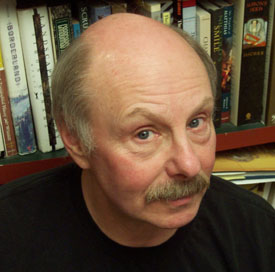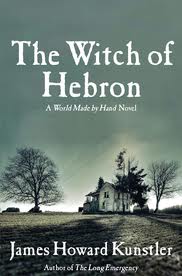Bradford Morrow: The Diviner’s Tale
April 5, 2011 by David
Filed under Fiction, WritersCast
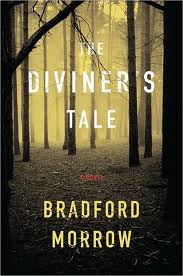 978-0547382630 – Hardcover – Houghton Mifflin Harcourt – $26.00 (ebook version also available)
978-0547382630 – Hardcover – Houghton Mifflin Harcourt – $26.00 (ebook version also available)
I have read a number of truly fine books over the past couple of years, most of which I have talked about on Writerscast. It’s important to me that I’ve only been writing and talking about books I really liked. A few of these wonderful books have just bowled me over, and Bradford Morrow’s The Diviner’s Tale is one of those. It’s a tightly woven story and powerfully interior, paradoxically, as it is set in a variety of geographic locales (all familiar to the author and therefore quite beautifully described).
Reading this book, I found myself propelled by the force of the story, and enthralled with the main character Cassandra Brooks, a single mother of two boys, daughter of a professional dowser, who is blessed and cursed by visions (Cassandra in Greek mythology had the gift of prophecy) and conflicted about her own ability to find water underground (the last name Brooks is no accident either).
The book opens with a chilling and frightening event – Cassandra is walking the woods for a client and comes across a hanged girl, who is to her, not an apparition. But when she brings the local sheriff to the scene (he is a former love interest – it’s a typical small town in upstate New York where everyone knows everyone), there is no sign of the hanged girl. But they find another girl, and that launches the story’s trajectory which ultimately forces Cassandra to confront long buried secrets in her past and some very real and dangerous possibilities for her in the present.
While the story is set in upstate New York, near the Delaware River, a significant part of the book takes place in the beautifully drawn islands of Maine near Mt. Desert – more water, more mystery, more danger for Cassandra and the reader.
Morrow is a terrific writer, and has written a number of very fine novels, but this one may well be his best book thus far. The Diviner’s Tale is a bit of a mash up, taking elements of mysteries, thrillers, and even supernatural novels, merging them into a dark melange that stands alone as an original work of modernist fiction. I liked what Joyce Carol Oates said about it – “luminous and magical…a feat of prose divination.” Well put indeed.
This book is a great pleasure to discover.
And talking to Brad was a pleasure as well. He knows himself, his work, and what it means. He talks fluently about this book, and the story of how the novel was born is definitely worth hearing. I hope you will enjoy our conversation as thoroughly as I did.
The author’s website is worth a visit too – you get a chance to read some of his stories and find out more about his many projects (I knew Brad first as the editor of the extraordinary and long lasting literary magazine Conjunctions, now up to issue #55, and which has managed to retain its sense of discovery over many years and many different literary styles and genres).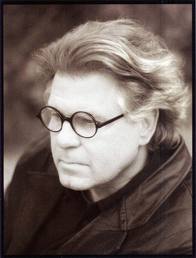
Podcast: Play in new window | Download
Steve Lehto: Chrysler’s Turbine Car: The Rise and Fall of Detroit’s Coolest Creation
March 24, 2011 by David
Filed under Non-Fiction, WritersCast
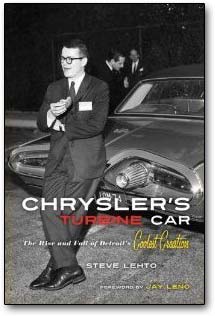 978-1569765494 – Hardcover – Chicago Review Press – $24.95 (e-book edition available)
978-1569765494 – Hardcover – Chicago Review Press – $24.95 (e-book edition available)
Steve Lehto’s portrait of the Chrysler Corporation’s amazing effort to engineer a turbine powered automobile is a terrific book, and alot of fun to read. You don’t have to love cars to enjoy this book, though I am sure it helps. But even if you don’t care about engines, and the dedicated engineers who spent years working on the turbine car program, you will learn a great deal about the industrial, social and cultural history of post World War II America.
Like so many kids who grew up in the 50s and 60s, I was enthralled with cars of all kinds, and when the Chrysler Turbine was first unveiled in 1964, along with millions of other Americans, I was fascinated and captivated by it – not only was it a beautifully designed car, futuristic and smooth, but it featured an engine like nothing else the world had ever seen up to that time. It was the Jet Age in automotive design, and here was a car with an airplane inspired engine in it.
The Chrysler Turbine represents an incredible commitment on the part of a major American automobile manufacturer to develop and popularize a truly radical alternative powerplant to the American driving public.
Chrysler’s turbine could run on almost any fuel – diesel, peanut oil, perfume, even tequila. Imagine what would have happened if the company had been able to devote hundreds of thousands more engineering and testing hours to the development of this engine over an additional 40 or 50 years. It’s entirely possible that we would not be worrying about hybrids, diesels and electric cars today. Reading Chrysler’s Turbine Car will give you a great understanding of the challenges any major new automotive development must face in order to become widely popular.
After a number of years of development and several generations of engine development, Chrysler hand built 50 examples of the the Turbine (that was its only name) and made them available to selected members of the general public for testing. Drivers could keep the cars for three months and were required to keep detailed logs of their experiences. Chrysler personnel maintained all the cars, flying all over America to repair and sometimes rescue cars that had problems, large or small. In all, the fleet registered over a million miles of testing, and performed extraordinarily well. Chrysler gained a huge amount of publicity and increased sales of their regular new cars, as well as learning a tremendous amount through the extensive practical use of their radically designed and built Turbine car by real drivers.
Unfortunately, for a variety of reasons, Chrysler ultimately abandoned the program completely, and destroyed most of the cars they had built. Only a few were saved and sent to museums to be put on display – which is where most of them still are today. Interestingly, Jay Leno was able to buy one of Chrysler’s own survivors and now drives it regularly. Author Lehto was able to drive Leno’s Turbine as part of his research for the book, and Leno contributed a foreword to this book.
Lehto interviewed every surviving member of the Chrysler team that built and maintained the cars during their short period of glory. He also spoke to many of the people who were lucky enough to be participants in the public lending program; their stories help make the book a fun and enjoyable read.
In many ways it is understandable why the Turbine car program was killed by Chrysler, even after so much effort and money had been invested in it. For a single car manufacturer to introduce a radical new powerplant completely outside the mainstream of engineering practice was ultimately economically unsustainable. But it’s impossible for us not to regret that Chrysler gave up on the multi-fuel efficient turbine in 1967, especially today, as we are facing a future when do not have a viable alternative engine to replace our dependable and thirsty reciprocating gasoline dependent engines.
This is a fun and worthwhile book to read, whether you are interested in cars, American history, culture, business or general nonfiction. Author Lehto, an adjunct professor at University of Detroit – Mercy, has written a very readable book, full of interesting characters and great stories you don’t have to be a car nut to enjoy.
Podcast: Play in new window | Download
Harry Hamlin: Full Frontal Nudity
March 13, 2011 by David
Filed under Non-Fiction, WritersCast
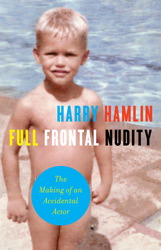 978-1439169995 – Hardcover – Scribner – $24.00 (e-book edition available)
978-1439169995 – Hardcover – Scribner – $24.00 (e-book edition available)
Harry Hamlin’s autobiographical memoir is not what you might expect if you are looking for a traditional “famous actor” tells-all but really tells-very-little story. Full Frontal Nudity is a completely honest, sometimes hilarious, sometimes sad, sometimes mind-boggling story about Hamlin’s growing up in suburban California and coming of age through two different college experiences and the beginning of his life as a professional actor.
This book is a thorough pleasure to read; Harry is a fine writer, and has a remarkable sense of the accidents and sometimes mysteries that go into making us who we are. And it’s also true throughout, whether intentional or not, by telling his own story, he becomes part of the larger social fabric of the 50’s, 60’s and early 70’s, and thus helps us understand what it was like to be alive during that now famous era of history. And for those many of us who were also there then, his story will remind us of some of the beauty and dangers we lived through.
The subtitle of this engaging memoir is important too: “The Making of an Accidental Actor.” Hamlin is clear that who he is today and how he got there represent the sum of a long series of accidents and choices with unintended consequences. As the book opens, we discover that Harry has an arrest record from 40 years ago that has suddenly prevented him from traveling to Canada, where he actually now lives part of each year.
How this happened is a great story, but what I liked most about it was the way that Harry told it on himself, unafraid to bare the truth about his life. I know that really good actors must learn how to do this, but they’re usually acting someone else’s drama, and thus are always protected on some level. There’s no hiding here, and it’s a refreshing turn. Hamlin is an actor, and a good one
Hamlin grew up in California, in a not quite normal household, and after high school headed for Berkeley at what some would say was just the right time – 1969. On the way to college, he managed an accidental detour that got him, shall we say, distracted. Intending to sign up for an architecture major, he found that there were no courses available, and the only ones available were drama, thus he embarked on what would eventually become his career. His time at Berkeley was suitably exotic, and included the drug possession arrest that later caused him so much trouble with the Canadian immigration folks. His time at Berkeley came to an untimely and early end because of a fire at the fraternity whose president he had become, and almost by magic, and again accidentally, he headed for Yale, where he flourished. Then another more or less accidental turn – he gives up a safe job as a PBS production assistant and takes an offer from the American Conservatory Theater, where a role in the play Equus ultimately led him to an outstanding film and TV career (notably LA Law, many others).
Overall Full Frontal Nudity is a terrific and wonderfully enjoyable book, and unsurprisingly, we had a thoroughly interesting and revealing conversation about the book and many of the stories he wrote about.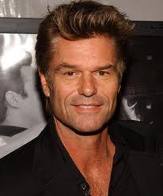
Podcast: Play in new window | Download
Lou Aronica: Blue
March 5, 2011 by David
Filed under Fiction, WritersCast
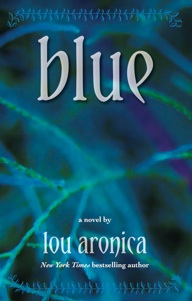 978-1936558001 – paperback – The Fiction Studio – $16.95 (e-book versions available $7.99)
978-1936558001 – paperback – The Fiction Studio – $16.95 (e-book versions available $7.99)
Lou Aronica’s Blue is an unusual novel, combining elements of science fiction, fantasy, romance and serious fiction, to create a moving story that focuses on the relationship between a daughter and her father in a terrifically moving and affecting way. Lou is an experienced and skillful writer who deftly manages to tell a story that is full of sadness and emotion and manages to avoid the deeply sentimental that might otherwise overtake the reader. Which is not to say it is not a story that will affect the reader – and some may find it difficult going, to say the least.
Reviewers and interviewers must always be careful in describing any novel’s storyline, to avoid ruining the book for prospective readers. For those who don’t want to know too much, let’s just say that Blue takes on family relationships in the face of grave illness in a beautifully imagined way. There is plenty of sadness in this novel, but Aronica succeeds in the true storyteller’s art, the transformation within a story to something greater than the experience itself.
The book is set in a contemporary suburban Connecticut much like the one the author actually lives in, so the characters and settings are all familiar and well told. At the heart of the story is the relationship between Chris Astor and his fourteen-year-old daughter, Becky, and her mother, from whom Chris is now divorced. Facing the greatest challenge of their lives, they must all learn to trust each other, and ultimately to believe in imagination and its transformational power, in order to come to terms with what is happening to them.
Blue is a remarkable and uplifting novel. I think Lou Aronica has succeeded in his goal for this book (from his website): “I wanted to write a novel that conveyed my feelings about the incomparable value of imagination and hope. Blue puts its characters through the wringer, but it is at its heart an extremely optimistic novel.”
Full disclosure: I am happy to say that Lou is someone whose friendship I value. I do want to say, also, that even if I just like a book and don’t love it, I’m unlikely to want to write about it and certainly won’t want to talk about it with the author. I feel my responsibility as an interviewer requires that I really get into a book in order to be able to ask meaningful questions about it and talk about it intelligently. I don’t love every book I read, but I truly do deeply enjoy and admire every book I write about here and talk about with their authors. For me, there is no question that Blue is a terrific book and my conversation with Lou reflects that assessment.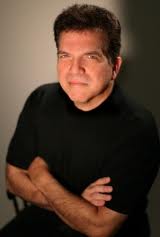 This is a book I am happy to recommend to readers, and I think it will be especially moving to anyone who is the parent of children of any age.
This is a book I am happy to recommend to readers, and I think it will be especially moving to anyone who is the parent of children of any age.
Podcast: Play in new window | Download
Brom: The Child Thief
February 23, 2011 by David
Filed under Fiction, WritersCast
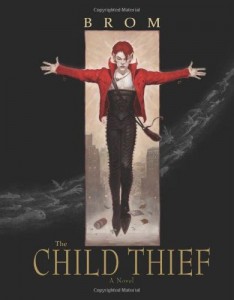 978-0061671340 – paperback – Harper Voyager – $19.99 (ebook editions available at $9.99)
978-0061671340 – paperback – Harper Voyager – $19.99 (ebook editions available at $9.99)
The Child Thief by well known illustrator and writer Brom is an absolutely stunning book. It is the Peter Pan story retold in a brilliantly imagined fashion that is completely captivating. So, yes, I did love reading this book. It is immersive, scary, and dark, but it is also wildly creative, and mashes up some of our most powerful mythological story lines to create its own narrative drive and a world inside, aside, and connected to our own that is fantastic (literally) and wonderfully psychological, and even political.
I really do not want to tell too much about the world that Brom has created, its characters or the story line as it is so much fun to discover it on one’s own. The genesis for the story was Brom’s discovery of a line in James Barrie’s original Peter Pan he found frightening but crucial, where Barrie mentions that Peter Pan would “thin out” the Lost Boys when the island population got too big. This single statement sheds a very dark light on the entire construct of the mythology of Neverland. And as he says about the character of Peter Pan himself, who kidnaps children and kills pirates (among others) – he is not really such a nice character as we imagine him now: “And more chilling is Peter’s ability to do all these things—the kidnapping, the murder—all without a trace of conscience: “I forget them after I kill them,” he (Peter) replied carelessly.”
In The Child Thief, Peter is indeed a boy who will never grow up, but his existence is oh so much more complicated than the movie and stage versions we know. Peter travels to modern day New York City to find new members for his tribe, who fight real battles in a Neverland that is now a part of Avalon and includes a great deal of real danger – even just to get there requires a frightening and challenging journey (a true rite of passage for the lost adolescents Peter has convinced to join him).
Brom’s Avalon is going through a very difficult time and there are many painful moments in this book. Death and suffering are everywhere here – this is not a book for the faint of heart or those looking for escapist fiction. By conjoining the world of Avalon to our own, and especially to the painful and bloody history of the conquering of the North American continent by European soldiers and settlers, the author has brought us face to face with the darkest elements of the modern industrial society to which we have evolved. Even at the end he avoids the easy and satisfying resolution of his story that many readers may be seeking. It’s not entirely a dark ending, but neither is it thoroughly uplifting. Personally, I loved the ambiguity throughout the book.
Brom is indeed a terrific artist – there is a section of his beautiful, evocative and sometimes chilling illustrations of all the characters in the middle of the book that is truly compelling. You can see more of his work at his website.
It was a pleasure to have a chance to speak with Brom about his work and specifically about this book. It’s so richly imagined and has so many layers, it’s easy to talk about. Brom is a wonderful story teller with a great deal to say. This is a compelling book for anyone who loves to get lost in a fully imagined alternate universe – and this one happens to be very familiar and therefore powerful, as it shatters all of our expectations so beautifully.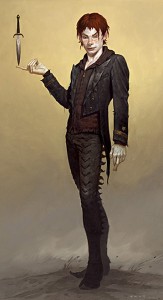
Podcast: Play in new window | Download
James Howard Kunstler: World Made by Hand
February 9, 2011 by David
Filed under Fiction, WritersCast
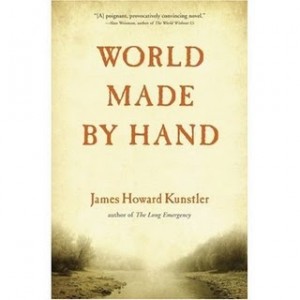 World Made by Hand – 978-0802144010 – paperback – Grove Press – $14.95 (e-book edition available)
World Made by Hand – 978-0802144010 – paperback – Grove Press – $14.95 (e-book edition available)
The Witch of Hebron: a World Made by Hand novel – 978-0802119612 – hardcover – Atlantic Monthly Press – $24.00 (e-book edition available)
This is an unusual podcast for me as it covers two books, World Made by Hand and the next in what looks to be at least a trilogy for author Kunstler, The Witch of Hebron. I had heard of, but never read any of Jim Kunstler’s books before these two, which I read much the way I read science fiction and fantasy novels when I was young, voraciously, entering and imaginatively inhabiting the world the author has created, joyfully, and always wanting more.
These two books are set in a fictional town in a real region of upstate New York, near the Hudson River, several hours north of Albany, in a period that Kunstler has dubbed The Long Emergency. That is the title of his most recent and best-selling work of nonfiction, a book I subsequently read and now believe is one of the most important books of our time.
In The Long Emergency, Kunstler describes why our current civilization is inevitably going to collapse. This is by no means a joyful prediction, but as his novels illustrate, the world ahead as we might imagine it, is not completely grim or devoid of joy and earthly human pleasure either. It is a post-fossil fuel world, and therefore much, much larger – humans do not travel thousands of miles in a day any longer. Governments have, for the most part, collapsed along with the great powerful corporations that have come to dominate our landscape. There is effectively no interstate commerce. Agriculture based on human and animal power is the dominant feature of daily life for most people.
There is a rise in human suffering, but a massive decline in human population, and during the period in which these novels are set, relatively soon after the collapse of modern civilization, there is a great deal of rediscovery of the tools and methods on which human life was built over the many centuries preceding the 21st. There are still many who remember how things were, and their beings are marked by what they knew, and lost, and now, as they are relearning how to live, by rediscovery of a different set of values. The younger generations know nothing directly of the world we now take for granted. Their lives have always been slower than ours, more physically challenging, and much more about adaptation to one’s direct physical environment. In addition to the daily necessities, it is personal relationships, family, community and local culture that this world revolves around. It is a world made by hand, and sometimes much rougher and more painful for being so, but there is a palpable sense of redemption and concern for what is good and right that underlies the world that Kunstler has imagined, that gives meaning to the struggles his characters must face throughout these two books.
Kunstler is a terrific writer and storyteller. These are fully imagined characters living in a plausible future. I can’t wait to read the next book in the series, and since it won’t be published for some time, I have been reading Kunstler’s older novels (most of which are sadly, out of print). When we talked, I had not read The Long Emergency, so our conversation is focused solely on the two novels which followed it. I’d recommend to anyone who has not read these books to start with the fiction as I did, and then go back to the nonfiction. It’s important for us to have an understanding of where we are headed, and I think it helps us to face the difficulties ahead if we can imagine ourselves into a better place, just as Jim Kunstler has done with A World Made by Hand and The Witch of Hebron.
Do visit Jim’s website, which continuously presents valuable information about where we are and what we can do about it. Make sure you take a side trip to the mini-site for these novels, which is a beautifully put together experience in and of itself. A great author biography here. We had a fantastic wide-ranging conversation about the novels, the world they are set in, and how these characters and their stories illustrate the future Kunstler has so beautifully imagined and portrayed.
Podcast: Play in new window | Download
Mickey Leigh: I Slept with Joey Ramone
January 28, 2011 by David
Filed under Non-Fiction, WritersCast
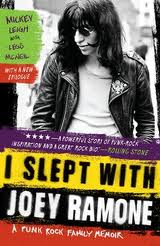 978-1439159750 – paperback – Simon & Schuster – $15.99 (ebook versions available $12.99)
978-1439159750 – paperback – Simon & Schuster – $15.99 (ebook versions available $12.99)
Mickey Leigh grew up in Queens in the 1950s and 1960s as Mitchel Hyman. His brother was Jeffrey Hyman, more famously known as Joey Ramone, lead singer of the great American punk rock band, The Ramones. I Slept with Joey Ramone (subtitle: a punk rock family memoir) tells their story from the beginning to the end of Joey’s relatively short life and just a bit farther into the almost present day. Mickey had some writing help from rock journalist Legs McNeil, and throughout the book, the story is told compellingly in Mickey’s voice and from his perspective.
We start in Queens where the boys grow up somewhat rockily. Their family situation was never easy, and Mitchel and Jeff were bullied misfits. Joey had both physical and psychological issues that manifested early in his life. Music became their savior very early, but at the beginning it was Mitchel (Mickey) who was the musician, and it took some time before the very complicated Jeff got together with the band that became the Ramones and found not only his voice, but his new identity.
The Ramones story as told by Mickey Leigh, is pretty incredible, even for fans who know something about the band and were there during the glory days. The relationships between the various band members were legendarily terrible. How this band stayed together and made such incredible music is still a mystery. Mickey was there at the beginning; John Cummings, aka Johnny Ramone, was initially his best friend. Mickey ended up being the band’s first roadie, while Joey, the quintessential misfit outsider, became the front man singer of what eventually became one of the greatest rock bands of all time. Later Mickey had his own career with a number of bands, as well as being a songwriter too.
The many stories and incidents recounted in this book are never boring, even when the sometime strange and complicated elements of Joey Ramone’s personality begin to repeat themselves over years. There is a tremendous amount of love here, and some not so nice things as well. Mickey’s own story is complicated and he has alot to say about alot of the people he worked with, for and sometimes against throughout the years. Nothing here is ever boring. It’s sometimes sad and frustrating to know how things were for Joey Ramone and his family, friends and associates, as it was often difficult, confusing and painful for all of them. Even years later, when they were inducted into the Rock and Roll Hall of Fame, the Ramones created an emotionally complicated scene.
Ultimately, Mickey (and doubtless Legs too) has captured beautifully a unique and special part of modern musical history, that is also the story of redemption, which is after all, the real story of rock and roll. And at the end Joey and Mickey always did make up. As Mickey tells it, the last time really counted the most. “He pulled me down to him, and he just didn’t let go. I can still feel that hug.” This is a book well worth reading for anyone interested in New York punk rock. I had a great time talking to him about the book and his experiences in rock and roll.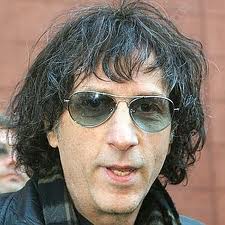
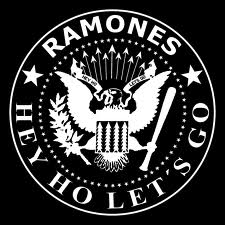
Podcast: Play in new window | Download
Douglas Rushkoff: Program or be Programmed
January 11, 2011 by David
Filed under Non-Fiction, WritersCast
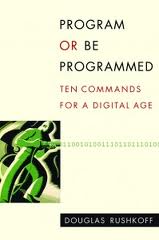 978-1935928157 – Paperback – OR Books – $16.00 (ebook edition $10.00)
978-1935928157 – Paperback – OR Books – $16.00 (ebook edition $10.00)
with terrific original illustrations by Leland Purvis.
I think this book, Program or be Programmed: Ten Commands for a Digital Age by digital critic and thinker Douglas Rushkoff, should be required reading for anyone interested in modern culture, politics or economics. It’s a short book, densely argued, that requires careful reading and attention to its ideas. Which probably makes it daunting to many in this era of fragmented ideas and short subjects. But it’s divided into ten clear sections (note “commands” as in programming inputs, rather than “commandments” as in biblical instructions) and is well worth the effort a reader must put into reading it.
I spent more time with this short book than with many much longer books I have read recently. And I am very happy I did. As Howard Rheingold says “Thinking twice about our use of digital media, what our practices are doing to us, and what we are doing to each other, is one of the most important priorities people have today.” It’s impossible not to agree. And Rushkoff understands the complexity of behavior and thinking that the always-on, always-connected internet has brought to modern culture.
It’s not about whether the internet is good or bad, or whether online culture somehow supplants a more preferable offline one. As the publisher says about this book, “the real question is, do we direct technology, or do we let ourselves be directed by it and those who have mastered it? “Choose the former,” writes Rushkoff, “and you gain access to the control panel of civilization. Choose the latter, and it could be the last real choice you get to make.”
Having the opportunity to talk about these ideas with Rushkoff was tremendously exciting and invigorating. He’s a really smart guy whose clarity of thought I admire alot. I’ve spent alot of time participating in, reading about and analyzing new media and modern culture myself, and I know I have learned alot from Douglas Rushkoff’s books and ideas. I think Program or be Programmed is one of the most important books I have read in a long time.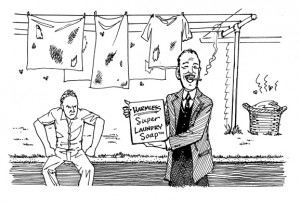
Podcast: Play in new window | Download
Claudia Dreifus: Higher Education?
January 3, 2011 by David
Filed under Non-Fiction, WritersCast
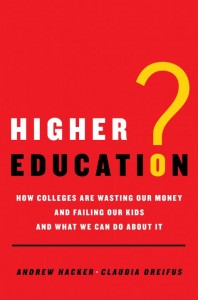 978-0805087345 – Times Books/Holt – Hardcover – $26.00 (ebook edition available at $12.99)
978-0805087345 – Times Books/Holt – Hardcover – $26.00 (ebook edition available at $12.99)
I well remember reading the work of sociologist Andrew Hacker many years ago (and was particularly impressed by his now out of print The End of the American Era). When I learned that he and New York Times writer Claudia Dreifus had collaborated on a new book about the modern college and university system, I knew I would want to read it. The complete title and subtitle of the book is important as it tells what the book is about pretty clearly: Higher Education?: How Colleges Are Wasting Our Money and Failing Our Kids—and What We Can Do About It. While this book takes a far different approach than Anya Kamenetz’s DIY U, the two books really should be read together by anyone interested in the future of higher education. (My interview with Anya can be found here in the Writerscast archives.)
Here is how Hacker and Dreifus describe this book on their excellent and highly recommended website:
“Higher Education? asks what students and families receive for the approximately quarter of a million dollars four years at a top-tier American university cost. With many prestigious universities hinting of continued tuition hikes, with the rate of student debt increasing to crisis levels, we ask, “How did a college degree become the second most expensive purchase families will make in their lifetimes?”
Plus: “Are young people getting good value for their enormous investments?”
We hope that our book can trigger a national discussion. With a system this large and complex, we certainly don’t have all the answers. But we hope to toss a few pertinent—and impertinent–questions into the public square.”
I think their questions, their many criticisms, and their suggestions for positive change mostly ring true. As almost everyone knows, the cost of a four year college education has become astonishingly expensive, and there seems to be no way to slow down the out-of-control machine. Hacker and Dreifus question some basic assumptions that so many parents, high school educators and kids themselves take for granted – that the more prestigious schools are “worth” their costs, that the expense of a four year college education is justified by the later benefits of coveted high income employment, etc. But they also ask, what should a college education be for, and how do colleges measure up to what we expect from them.
If going to college is only about students later getting the best jobs, are colleges providing education or some sort of high end vocational system? What is the justification for college sports? Do highly paid tenured professors really contribute to the education of students in ways commesurate with their salaries, and how do we justify all the many layers of bureaucracy in colleges and universities throughout America that do not provide significant educational value to the students who bear the majority of the costs they incur? And what about the low-paid, overworked adjunct professors who bear the brunt of the teaching burden in so many institutions of higher learning?
One could expect quite a bit of controversy about this book and certainly quite a bit of resentment by many of the established academic interests they attack. Interestingly, Vartan Gregorian, the former president of Brown University and current president of the Carnegie Corporation of New York loves the book: “With facts, figures and probing analysis, authors Andrew Hacker and Claudia Dreifus clearly lay out why so many colleges and universities are helping to support a de facto American class system while failing their primary mission of preparing not only skilled labor but also producing educated, knowledgeable citizens who can play a role advancing our national life and strengthening our democracy.”
Reading this powerfully argued book can make one almost uncomfortable, as they question so many of the benefits of higher education we tend to take for granted. But in the end, it is difficult not to agree that there is much that needs to change in the way our colleges and universities function in society. The future of American higher education looks grim if we do not address these issues in the very immediate future.
I had originally hoped to interview both the authors together, but while that was not possible, my discussion with Claudia Dreifus was both lively and interesting. Since Claudia’s background is in interviewing, she handles being the interviewee with aplomb and grace. I’d recommend listening to this interview and then reading the book as soon as possible. You will want to learn more, I think then, about how you can work toward making actual change in the American educational system. Visiting the Hacker/Dreifus website might be a good start but I do think it will require organized, meaningful action especially by parents and their children as they are the ones most able to cause change to occur. Is there anyone who can lead such a movement? Or will the current system simply continue on its present arc until the cost of education is so high that consumers finally just say “no more?”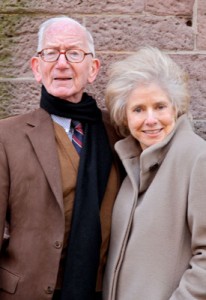
Podcast: Play in new window | Download
Jaimy Gordon: Lord of Misrule
December 18, 2010 by David
Filed under Fiction, WritersCast
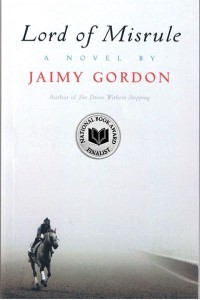 978-0-929701-83-7 – Hardcover – McPherson & Company – $25.00
978-0-929701-83-7 – Hardcover – McPherson & Company – $25.00
I can’t say enough good things about Jaimy Gordon’s writing, up to and including Lord of Misrule, this year’s winner of the National Book Award. Although she has been writing for the past 40 years, producing five wonderful, interesting novels and a number of smaller works during that time, for the most part Jaimy’s audience has been small. Perhaps this is fitting for someone whose work does not easily fit the standard categories of commercial fiction, as the structure of the publishing and bookselling machinery has not provided much room for many writers and books outside the mainstream for quite some time.
That said, Jaimy Gordon is simply a terrific writer and Lord of Misrule may well be her best book yet. It’s set in a mythical down-and-out racetrack Indian Mound Downs, downriver from Wheeling, West Virginia. There are five main characters, all from disparate and desultory backgrounds, but all connected by their wishes, dreams and aspirations, which drive them and the novel forward. And the book is constructed of four sections, each named for a particular horse in a particular race. The story unfolds almost magically, and it’s one of those books that is literally impossible to put down. I was hooked early on and loved the ride the author took me on, peopled by wonderful down and out Runyonesque characters who speak amazing dialogue in the voices of Appalachian region horse people, and of course beautiful horses throughout.
Here’s a brief excerpt from the book that gets across a bit of the style of the book (and you can download a PDF excerpt of the novel at the publisher website here):
“They were all looking for a van like a Chinese jewel box, like no horse van that had ever been seen on a backside, something red and black and glossy, with gold letters, LORD OF MISRULE, arched across each side. All the same when a plain truck with Nebraska plates rolled in . . . they knew who it was. They were watching, though the van was unmarked and dirty white, one of those big box trailers with rusty quilting like an old mattress pad you’ve given to the dog. The van bounced and groaned on its springs along the backside fence, headed for the stallman’s office. Red dust boiled around it. They blinked as it dragged two wheels through the puddle that never dried, the puddle that had no bottom. . . . They peered through the vents when the van went by and saw the horse’s head, calm, black and poisonous of mien as a slag pile in a coal yard . . .
The van stopped, woof, down comes the ramp and a kid, unhealthy-looking like all racetrack kids, worm white, skull bones poking out of his skinny head, stood at the top of the ramp with a small black horse that couldn’t even stand right: Lord of Misrule . . . rocked on the flat floor of the van like a table with one short leg. And those legs – they were so swelled out from long-ago bowed tendons on both sides that they were one straight line from knee to ankle, drainpipes without contour. ”
I’ve been reading (and admiring) Jaimy’s work for a long time, since her first published work Shamp of the City-Solo was thrust into my hands by her publisher Bruce McPherson probably in 1975. It’s a thrill to see her work recognized more widely and gratifying to know that this excellent writer will now always have a much larger audience for her writing. She and this new book are getting great coverage in all sorts of media. Here’s an excellent profile of Jaimy by Chip McGrath in the New York Times: Writer Races to Victory From Way Off the Pace. There have been many others, many of which have focused more on the storyline of “obscure writer finds sudden fame” than on her book and writing career.
I wanted to spend a good amount of time talking in detail with Jaimy specifically about this book, Lord of Misrule, along with something of the story of how this book came to be published (it’s a good story, reflecting much about the nature of independent publishing and serious fiction – discussed in more detail in my companion interview with publisher Bruce McPherson).
Jaimy Gordon is a terrific writer who has a lot of important things to say, and I’m very pleased to have had this opportunity to talk to her about her work.
Podcast: Play in new window | Download


